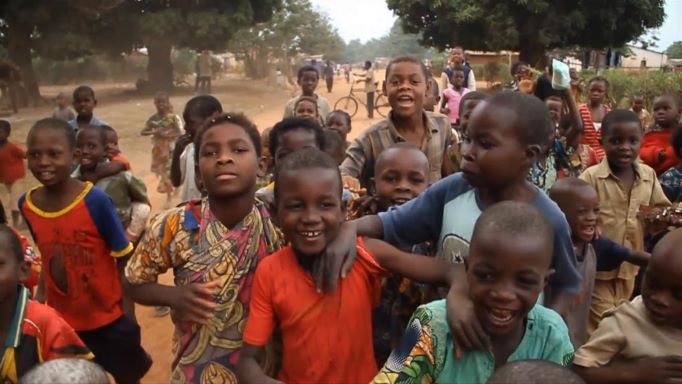On World Mental Health Day, the agencies recommit to their 10-year joint programme to support the mental health and psychological wellbeing of children and adolescents across the continent.
BRAZZAVILLE/NAIROBI/DAKAR– At least one in seven children in sub-Saharan Africa experiences significant psychological hardship. As the world marks World Mental Health Day, UNICEF and WHO shine a light on the need for increased investment and access to mental health prevention and response services on the continent.
Children and adolescents are always at risk of developing mental health problems, especially vulnerable children facing poverty, discrimination and violence. The lack of access to basic social, health and education services, combined with wide-reaching structural inequalities, are all known to be aggravating risks for mental ill-health.
The effects of climate change, compounded by high rates of HIV infection, adolescent pregnancies and humanitarian emergencies, are also ongoing threats for the mental wellbeing of children and adolescents in Africa. Research shows that 50 per cent of mental health conditions start by age 14 and 75 per cent by the mid 20s.
“Addressing child and adolescent mental health in Africa is urgent. Over the years, millions of young people have been exposed to challenges most adults would find very difficult to cope with, often having to deal with the psychological impacts on their own. Our systems are still failing them,” said Mohamed M. Fall, UNICEF Regional Director for Eastern and Southern Africa.
In order to respond to this growing crisis, UNICEF and the WHO committed to a 10-year Joint Programme on Mental Health and Psychosocial Well-being and Development of Children and Adolescents in Africa. Signed in 2020, this decade-long collaborative effort is working with local Governments to strengthen mental health and psychosocial support systems for children, adolescents and their caregivers. This would also help bring mental health into national preparedness efforts and take away any stigma that might come with mental health issues.
Investment in mental health remains extremely low in Africa, with government expenditure at less than one US dollar per capita. We simply cannot afford to let millions of children needing care go without help,” said Dr Matshidiso Moeti, WHO Regional Director for Africa. “It is time to make a difference and ensure that children grow into adulthood free of the potentially lifelong and devastating impacts of unaddressed mental health challenges.”
COVID-19 has further shone a spotlight on global inequalities, including mental health care. The well documented statistics regarding vaccine availability in Africa compared to high income contexts is a stark reminder.
Children in Africa have been exposed to even greater threats with school closures, increased exposure to armed conflicts, and lack of opportunities to play and socialize with their peers. The long-term lockdowns have reportedly increased early marriage, teenage pregnancies and sexual and domestic violence towards children – especially girls.
Despite this high burden, availability and quality of mental health services for children and adolescents in Africa are greatly lacking. Even in countries where specialised child and adolescent clinical psychologists and psychiatrists exist, on average there is only 1 per 4 million population, with health and social care professionals skilled in mental health often concentrated in larger cities, unreachable by most of the population at risk.
Preventive measures remain key, most notably promoting healthy lifestyles including exercise and good nutrition, and protection against harmful practices and violence, including strengthening skills in communication and conflict resolution.
Updated and costed child and adolescent policies on mental health do not exist in many of the countries in Africa. Out of 39 countries that responded to the Mental Health ATLAS 2019, 11 countries indicated they had stand-alone Child and Adolescent Mental Health Policies and/or Strategies. Nine countries out of the 39 that responded indicated they had in-patient services for children and adolescents, while 12 indicated they had out-patient services for children and adolescents. Only 5 out of 39 countries that responded had Community-based Child and Adolescent Mental Health
The most recent data indicates that on average, African Ministries of Health allocate about 90 US cents per capita to mental health, up from 10 US cents from the 2016 report. This is often allocated to large psychiatrict institutions, in the bigger cities with only about 15 per cent getting to the primary and the community health levels.
“COVID and the response measures have created an environment on uncertainty, isolation and anxiety. The number of children targeted for mental health and psychosocial support across West and Central Africa since the pre-Covid period has almost doubled (87 per cent) from just below 1.1 million in 2019 to almost 2 million in 2021. Sadly, these estimates are probably only part of the real need. Long-term investments for child and adolescent mental health care in Africa is needed to turn recent donor support into sustainable services,” said Marie-Pierre Poirier, UNICEF Regional Director for West and Central Africa.
“We urge member states and regional bodies to prioritise and commit to further investing in the mental health of children and young people across Africa. This is an essential part of our care for children,” she added.
Investing in child and mental health in Africa now will literally pay off in the future. The latest UNICEF State of the World’s Children Report reveals that school-based interventions addressing anxiety, depression and suicide provide a return on investment of US$21.5 for every US$1 over 80 years. According to the report, the biggest results were in lower-middle-income countries, with a return of US$88.7 on every dollar invested.

